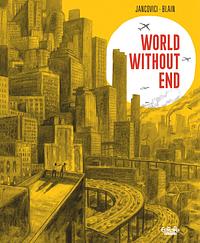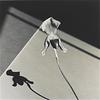Take a photo of a barcode or cover
challenging
dark
informative
hopeful
informative
inspiring
reflective
fast-paced
adventurous
challenging
dark
emotional
funny
hopeful
informative
inspiring
lighthearted
mysterious
reflective
tense
medium-paced
Information dense, but very entertaining and persuasive.
emotional
hopeful
informative
reflective
slow-paced
The artwork is a bit Scott McCloud, but the story is not as strong as it could be, far too hopeful and with the belief that science can solve anything. There are also a great many factual errors about where the problems lie (they fail utterly to blame the out of proportion consumption of the upper middle class, 20% consuming 65% of the oil on earth, NOT counting the wealthy; no doubt this is because they are both entitled upper middle class people).
It's still a good introduction for those who haven't been following these issues for 45 years, but it's really writting on the level of the average person, which is to say it's like journalism and dumbs things down to a 7th or 8th grade level, losing a lot of nuance (as they ignore aspects mentioned above).
It's not a bad place to start, but reading Heat by Monbiot is better.
It's still a good introduction for those who haven't been following these issues for 45 years, but it's really writting on the level of the average person, which is to say it's like journalism and dumbs things down to a 7th or 8th grade level, losing a lot of nuance (as they ignore aspects mentioned above).
It's not a bad place to start, but reading Heat by Monbiot is better.
Lecture absolument géniale et nécessaire et si claire et juste vraiment bien !
dark
informative
informative
reflective
medium-paced
Christophe Blain is an extraordinary graphic storyteller, and as he here gets to work with Jean-Marc Jancovici, “the guy behind carbon accounting,” it’s a match made in a carbon free heaven. Their book is about our time, what Michelle Nijhuis has called the age of extinction. Blain and Jancovici show us that most of the electricity we use is tied to the fossil fuel industry dumping their waste in our atmosphere, adding pollutants to our shared oxygen. We read, we feel, and then we understand. We’re all polluters, directly or indirectly, the difference is only in the degree at which we’re complicit. You are what you breathe.
Once, when scientists warned us that the atmospheric level of CO2 was getting too high at too fast a rate for the planet to cope, we thought we’d come together to stabilize our climate. After all, we’ve had the solution since the seventies: carbon price, a price to pay for pollution. How innocent we were, how youthfully naïve, thinking individualization couldn’t get worse. Turn the page and just look at us now. It turned out that what isolated us wasn’t technology after all, but the view that there is no such thing as society, that competitive self-interest is all there is, that we can’t do anything by working together, only by working against one another for short-term individual gains. When the short-term winners talk about what to do with the spoils, they call it free enterprise. But if the existence of a world society is impossible, then the Montreal Protocol shouldn’t exist, and yet there is empirical evidence in our ozone layer that we, as a global society, did manage to regulate ourselves from harming ourselves further. The book lays out what future global agreements need to hold us to if we’re to avoid complete collapse. If we serve only ourselves, in the long run we all lose. We’re bigger than that. Once, 193 sovereign states led one another by the example set by all as one. It’s when we help one another that we save one another.
Christophe Blain’s art is part of the substance that comes before the form. It helps us see what we've done, how we've blocked planetary protective progress all through the 20th century and on to a quarter into the 21st. Without legislation, making promises cost little, a cheapness that kills progress. It seems like the only thing humans love more than making promises when in love with life is breaking them when falling out of love, when we forget what it was we loved in the first place. The book shows us how deep our self-deceit runs and the outside mechanisms behind it. While we condemn overexploitation, we seem to forget our aversion to it as soon as we adhere to rules of a system we have no control over. We can’t get out of the system of the current world economy, and reading this book it struck me how mind-blowingly bizarre our present system is. Like a game whose rules say we must always produce more than the other participants, as trapped by the rules as we are. So we make sure overproduction and overconsumption always increase to keep up with the race of economic growth, only leaving behind all that in the end matters.
What’s our dream, stuck in this age we never chose? Can we find a way to see all these things more broadly, to compete cooperatively, to cooperate competitively, to love without excluding those not part of the otherness we’ve chosen, to love ourselves without needing our wealth to be bigger than anyone else’s, to grow not in material excess but in our change toward a wider happiness? Can we, in short, evolve? The rules of the global economy were written before we were born and can just as easily be rewritten. There are so many ways we could reinvent the economic system and shape it into something wiser, having studied history and scientific facts such as laid out in this book, learned from all that went wrong with the past system. What if we had a blank page for it and we could do it all differently this time, together? What rules would we write? Something like a metric for the most well-being for the least possible suffering. Something like the biggest dream. What dream would it take to get us out of this mess? Solitary imagination isn’t big enough. We need one another for this, and this book shows us how. When one person dreams alone, it is only an isolated fantasy. When many dream together, it is the beginning of a new reality. What different and better might be.
Once, when scientists warned us that the atmospheric level of CO2 was getting too high at too fast a rate for the planet to cope, we thought we’d come together to stabilize our climate. After all, we’ve had the solution since the seventies: carbon price, a price to pay for pollution. How innocent we were, how youthfully naïve, thinking individualization couldn’t get worse. Turn the page and just look at us now. It turned out that what isolated us wasn’t technology after all, but the view that there is no such thing as society, that competitive self-interest is all there is, that we can’t do anything by working together, only by working against one another for short-term individual gains. When the short-term winners talk about what to do with the spoils, they call it free enterprise. But if the existence of a world society is impossible, then the Montreal Protocol shouldn’t exist, and yet there is empirical evidence in our ozone layer that we, as a global society, did manage to regulate ourselves from harming ourselves further. The book lays out what future global agreements need to hold us to if we’re to avoid complete collapse. If we serve only ourselves, in the long run we all lose. We’re bigger than that. Once, 193 sovereign states led one another by the example set by all as one. It’s when we help one another that we save one another.
Christophe Blain’s art is part of the substance that comes before the form. It helps us see what we've done, how we've blocked planetary protective progress all through the 20th century and on to a quarter into the 21st. Without legislation, making promises cost little, a cheapness that kills progress. It seems like the only thing humans love more than making promises when in love with life is breaking them when falling out of love, when we forget what it was we loved in the first place. The book shows us how deep our self-deceit runs and the outside mechanisms behind it. While we condemn overexploitation, we seem to forget our aversion to it as soon as we adhere to rules of a system we have no control over. We can’t get out of the system of the current world economy, and reading this book it struck me how mind-blowingly bizarre our present system is. Like a game whose rules say we must always produce more than the other participants, as trapped by the rules as we are. So we make sure overproduction and overconsumption always increase to keep up with the race of economic growth, only leaving behind all that in the end matters.
What’s our dream, stuck in this age we never chose? Can we find a way to see all these things more broadly, to compete cooperatively, to cooperate competitively, to love without excluding those not part of the otherness we’ve chosen, to love ourselves without needing our wealth to be bigger than anyone else’s, to grow not in material excess but in our change toward a wider happiness? Can we, in short, evolve? The rules of the global economy were written before we were born and can just as easily be rewritten. There are so many ways we could reinvent the economic system and shape it into something wiser, having studied history and scientific facts such as laid out in this book, learned from all that went wrong with the past system. What if we had a blank page for it and we could do it all differently this time, together? What rules would we write? Something like a metric for the most well-being for the least possible suffering. Something like the biggest dream. What dream would it take to get us out of this mess? Solitary imagination isn’t big enough. We need one another for this, and this book shows us how. When one person dreams alone, it is only an isolated fantasy. When many dream together, it is the beginning of a new reality. What different and better might be.








